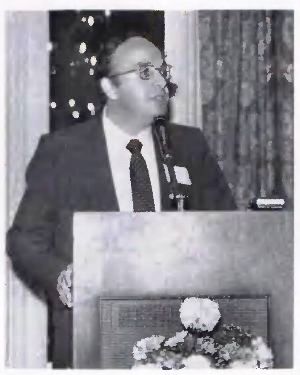![]()
The Words of the Durst Family
|
|
The Words of the Durst Family |

"He is a quiet-spoken and scholarly man who walked away from a career in the classroom to march in a crusade for worldwide moral revolution, a Jew who abandoned the faith of his fathers for the promise of a new religious prophet."
"His mission is to interpret the church's eclectic and evolving theology to critics who regard the Rev. Mr. Moon's organization as a spurious religious movement with clear cultic overtones. And he is charged with nudging the church toward the mainstream of American religious thought in the 1980's."
So the Chicago Tribune began its feature story of October 16, 1980 on the recently-chosen president of the American Unification Church, Dr. Mose Durst.
His own explanation of his mission:
"My task is to give maturity to
our zeal. We have to learn how to work with larger religions and the
academic community. We will not disappear -- the foundations have
been laid."
(Boston Sunday Globe, September 14, 1980)
Since he came to New York last spring to lead national activities, Dr. Durst has been constantly on the move. He gave the following summary of recent developments:
There are a number of exciting things happening with our movement lately in America. Aside from the conferences this summer, we sponsored a number of banquets in September, in New York, Washington, D.C., and Chicago, and are arranging for November banquets in Los Angeles, Oakland, Seattle, Austin, Denver and Atlanta.
Basically, we not only have a core group of solid members in these cities, but we want to show the public that the Unification Church is here to stay. Our task now is kingdom building.
By having these banquets, we can draw together hundreds of people in each city -- approximately 300 each in Washington and New York. These include professional people, major leaders, ambassadors and so forth who have worked with us over the years. We find that enormous numbers of people actually love our family. Oftentimes, we wonder who is behind us. Actually, we have numbers of people behind us, people of the highest level. It is just a question of tying them all together in a network, and we now have a very powerful network.
The Washington, D.C., banquet at the exclusive Cosmos Club was hosted by William Willoughby, publisher and editor of Religious News. He is a significant figure in the religious community. The banquet committee included Dick Gregory, famous civil rights activist and now an international personality. He and several leaders of local churches and community action groups spoke briefly.
The New York banquet at the Harvard Club was sponsored by Dr. Richard Quebedeaux, author and professor. Barry Farber, famous radio personality who ran for city mayor, gave a congratulatory message, as well as UN Ambassador Chavez, education and culture representative of 21 Spanish-speaking countries of Latin America.
They were followed by the new president of the New York Civil Liberties Union, Jeremiah Gutman, and by the director of the National Council of Church and Social Action, Rev. Dyson. The banquet in Chicago also served as a kick-off for the Midwestern Parents' Association. We also had wonderful media contacts at the University of Chicago.
On October 10, for the first time we were able to get major positive coverage on national television, on the program "Speak Up, America." This program draws an audience of 25 million. The poll after the show indicated only 67 percent of the people were negative and 33 percent positive. Even President Carter at that time had only 37 percent positive ratings.
In the past few months, we have also had major positive articles in the Boston Globe, Washington Star, Philadelphia Bulletin, Chicago Tribune, Oakland Tribune and San Francisco Chronicle, as well as all major New York papers (except of course the Times).
All this has been part of the process to show the true ideal of the Unification Church. We have been able to turn the media around, turn professors around, turn parents around, and show them what we are really like. Rather than be objective to negativity, we are trying to be subject.
"We are still the new kid on the block: he told the Washington Star on July 16, 1980. People can't resist the urge to beat us up!
To the Oakland Tribune, on May 1, 1980, he explained:
"We are going to stop being defensive, because we have [done] nothing to defend.
"The last thing this religion is a crutch or opiate. Being religious is hard work, and it requires constant thought. Others may speak or act without thinking of the consequences, but to be religious you must consider the morality, the implications of what you say."
Because of that, and because of the criticism and suspicion surrounding the church, he contended,
"The question is not why anybody leaves the Unification Church, it's why anybody stays."